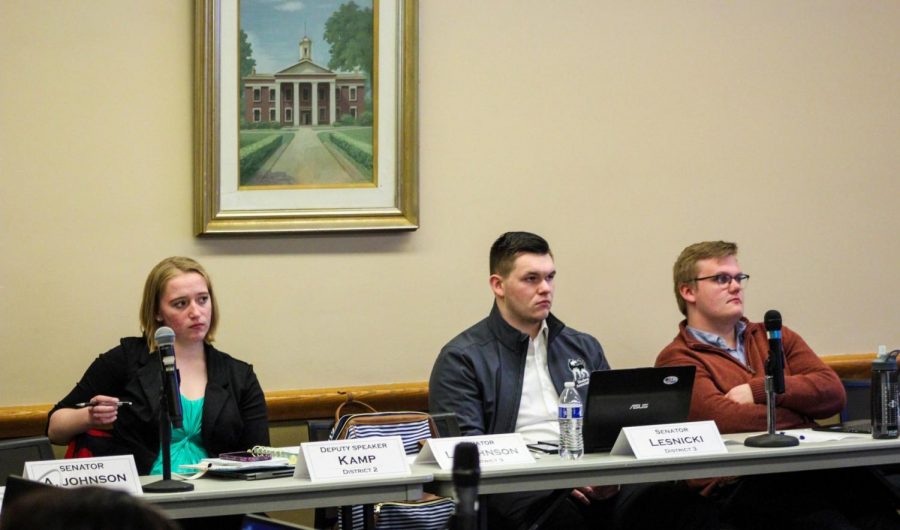SA updates policy following proposed censures
May 1, 2019
DeKALB — The SA Senate has been updating its finance policy and has recognized its outdatedness since at least January.
“Some parts of the finance policy are out of date, out of practice, or warrant reconsideration,” according to a Jan. 25 memorandum sent by the Rules and Procedures Committee.
Three censures against SA members were proposed March 24. Each censure alleged a failure to perform duties as prescribed by the bylaws.
A State of the Union address was held by SA President Khiree Cross and Chief of Staff Citrick Davis as a response. The SA has begun passing bills amending language to fix the issues perceived by both the legislative and executive branches.
Bylaw updates
Both the legislative and executive branches have suggested updating bylaws to reflect current practices.
“I think we should go back and redesign our bylaws so they are an accurate reflection of the [current] practices,” Cross said.
Cross suggested the SA fund restrictive organizations, which is currently forbidden by the Finance policy. Just because an organization collects dues does not mean they have a lot of money, he said.
Cassandra Kamp, deputy speaker of the Senate and member of the Rules and Procedures Committee, said there is outdated language in the bylaws. Both the executive and legislative branches have started reviewing their bylaws, she said.
At Sunday’s Senate meeting, eight bills were passed updating the bylaws. One of the bill’s stated purpose was to clarify language in the finance policy.
The bill amends Article I of the Finance policy to read, “A restrictive organization shall be unable to request any funding from the Student Association. An organization which charges dues shall be unable to request any funding from the Student Association.”
Historian Michael Kane, author of the bill, said the amendment is not adding language to the bylaws but is moving language from later in the Finance policy to the beginning.
Precedence
Cross, whose failed censure for an alleged misappropriation of $3500.33 failed to pass the Senate, said his actions have precedence.
Cross’ proposed censure failed to pass the Senate by a tie, according to the March 24 Senate meeting minutes.
The $3500.33 in question was executively allocated to NIU’s chapter of Cross’ fraternity, Alpha Phi Alpha Fraternity, Inc. for a regional and a district conference, according to a copy of the executive allocation spreadsheet given to the Northern Star.
He said SA has a history of executively allocating money to NIU’s to fund mandatory conference expenses.
The spreadsheet sent from Cross’ office, which contains records from fall 2016 on, confirms. In spring 2017, “Alpha Phi Alpha” received $2,294 with no listed reason; in spring 2018, “Alphas” received $2,120 with no listed reason.
The bylaws are unclear on whether executive allocations count as “SA funding,” which is subject to clear limitations as defined in the finance policy, said Speaker of the Senate Tristan Martin and Kamp, who are both members of the Rules and Procedures Committee.
The bylaws state that restrictive organizations can’t get SA funding, Kamp said. They do not explicitly state whether or not restrictive organizations can request executive allocations.
SA-funded organizations cannot require dues for membership, according to Part IV, Article 5, Section 3 of the SA bylaws. Organizations under a governing council — in this case, Alpha Phi Alpha Fraternity, Inc. is under the National Pan-Hellenic Council — must request funds from their council, according to Part IV, Article III, Section 2.A.
Cross said executive allocations are, and always have been, under the president’s jurisdiction.
“[The Finance committee’s] opinion is valid, but I don’t think [its] opinion has any influence over executive allocations and how the president handles money,” he said.
Kamp said there have been no appeals to the SA Supreme Court, which would be the next step for anyone who wished to challenge the censure’s failure to pass. The Supreme Court rules on bylaw interpretation, according to the SA Constitution.







